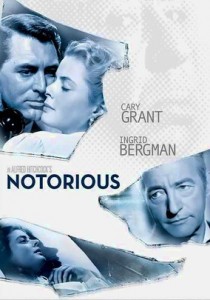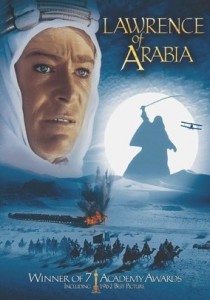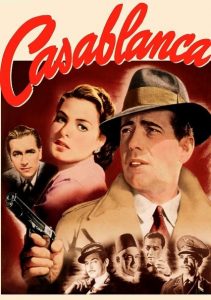Notorious-1946
Director Alfred Hitchcock
Starring Cary Grant, Ingrid Bergman
Top 250 Films #48
Scott’s Review #265
Reviewed August 11, 2015
Grade: A
Notorious is a classic Alfred Hitchcock film from 1946, a period that preceded his golden age of brilliant works in the 1950s and 1960s, but it is a marvel all the same.
Perhaps not as wonderful as future works, but that is like comparing prime rib to filet mignon. Shot in black and white, the subject matter is familiar to Hitchcock fans- political espionage.
The film contains elements familiar with Hitchcock’s films- romance with suspenseful plot.
Starring two greats of the time (and Hitchcock stalwarts), Carey Grant and Ingrid Bergman, one is immediately enthralled by the chemistry between the characters they play- T.R. Devlin and Alicia Huberman. Devlin, a government agent, recruits Alicia, per his bosses, to spy on a Nazi sympathizer, Alex Sebastian (Claude Raines), who is affiliated with her father.
Her father, having been convicted and sentenced to prison, has committed suicide. Alicia’s allegiance is questioned as she takes drastic measures to prove her loyalty and complete the hated assignment.
The film is set between Miami and the gorgeous Rio De Janeiro, where much of the action is set at Alex’s mansion.
A blueprint for his later works, Hitchcock experiments with creative camera shots and angles- specifically the wide and high shot overlooking an enormous ballroom.
I also love the airplane scene- subtly, Hitchcock treats the audience to background views of Rio from the view of the airplane as Devlin and Alicia converse.
The plane is slowly descending for landing, which allows for a slow, gorgeous glimpse of the countryside and landscape in the background.
Subtleties like these that may go unnoticed make Hitchcock such a brilliant director.
The character of Alicia is worth a study. Well known for his lady issues, did Hitchcock hint at her being an oversexed, boozy, nymphomaniac?
I did not think the character was written sympathetically, though, to be fair, she is headstrong and loyal in the face of adversity.
She parties hard, drives at 65 miles per hour while intoxicated, and falls into bed with more than one man. It is also implied that she has a history of being promiscuous.
Made in 1946, this must have been controversial during that period. The sexual revolution was still decades away.
Notorious also features one of Hitchcock’s most sinister female characters: Madame Sebastian (Leopoldine Konstantin). The woman is evil personified, and her actions are reprehensible. She is arguably the mastermind behind all of the dirty deeds and a fan of slow, painful death by poisoning.
My favorite scene is, without a doubt, the wine cellar scene. To me, it epitomizes good, old-fashioned suspense and edge-of-your-seat entertainment.
A cat-and-mouse game involving a secret rendezvous, a smashed bottle, a key, champagne, and the grand reveal enraptures this scene, which goes on for quite some time and is the climax.
Perhaps Notorious is not quite as great a film as Vertigo (1958), Psycho (1960), or The Birds (1963), but it is a top-notch adventure/thriller that ought to be watched and respected.
Oscar Nominations: Best Supporting Actor- Claude Rains, Best Original Screenplay



